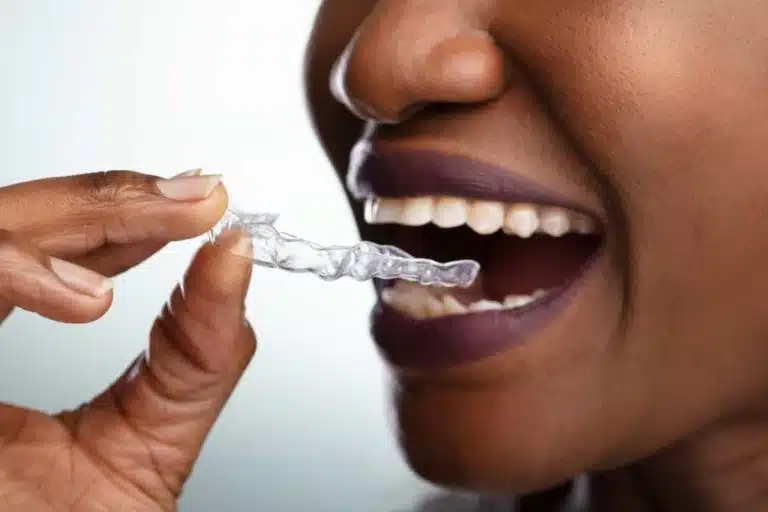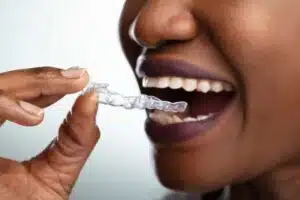Invisalign as Effective TMJ Treatment: Fact or Fiction?

Our jaws are composed of a marvel of human engineering, underpinned by the temporomandibular joint (TMJ) – a hinge that, when malfunctioning, can compromise our most basic functions like speaking or eating. TMJ Disorder, or TMD, can transform these everyday actions into painful challenges, emphasizing the imperative need for effective treatment solutions. Many are now wondering, “Will Invisalign help TMJ?”
While Invisalign is hailed as a revolution in orthodontics, every treatment has its strengths and limitations. Beyond aesthetics, can the clear aligner system serve as a beacon of relief for those grappling with TMJ symptoms?
What is TMJ and Its Symptoms?
The temporomandibular joint, located where the jawbone meets the skull, is one of the most complex joints in the human body. Designed to move in multiple directions, it facilitates a range of motions, from the up-and-down of chewing to the side-to-side of grinding. Yet, when this joint faces problems, TMJ Disorder or TMD is the resultant affliction.
TMD Symptoms
TMD doesn’t discriminate. It can manifest subtly with minor discomfort, or more pronouncedly with debilitating pain. Common symptoms include:
- Persistent jaw pain or tenderness
- A clicking or popping sound when opening or closing the mouth
- Difficulty in chewing or a sudden uncomfortable bite
- Swelling on the side of the face
- Earaches or tinnitus without an apparent ear infection
Several factors can lead to TMD: trauma to the jaw, erosion of the joint, improper jaw alignment, or even excessive gum chewing. Stress, which often leads to jaw clenching or teeth grinding, is also a notable culprit.
Traditional Treatments for TMJ
Over the years, the medical community has devised a plethora of treatment avenues for those suffering from TMD, tailored to the severity and nature of the symptoms. For some, relief may come in the form of over-the-counter pain relievers or anti-inflammatories, while others might need prescription muscle relaxants to ease muscle spasms.
For those with more persistent symptoms, dental splints or mouthguards can be prescribed. Designed to keep the teeth apart and prevent grinding, these devices can sometimes reduce strain on the TMJ. Physical therapy is another avenue, with exercises aimed at strengthening jaw muscles and improving joint flexibility.
In extreme cases where conservative treatments fail to provide relief, surgical interventions become an option. This might range from arthrocentesis, a minor procedure to remove debris from the joint to more invasive surgeries that repair or replace the joint itself.
Understanding Invisalign
In the vast world of orthodontics, Invisalign emerged as a groundbreaking innovation. Unlike traditional braces with their conspicuous metal brackets and wires, Invisalign provides a virtually invisible treatment method. Comprising a series of custom-made clear plastic aligners, this system gently moves teeth into their desired positions over time.
Invisalign’s primary mission is to correct dental misalignments, such as overbites, underbites, crossbites, and crowded teeth. Each aligner set, tailored for the individual, exerts precise force on specific teeth and is worn for about 20 to 22 hours a day, being replaced every 1-2 weeks as the teeth shift. With its convenience and discreet appearance, Invisalign has attracted many adults who might be reluctant to sport traditional braces.
However, the question remains: Will Invisalign help TMJ? Does a system designed primarily for teeth alignment have any implications for TMJ relief?
Will Invisalign Help TMJ?
Many TMJ issues arise from a misaligned bite or malocclusion. When the upper and lower teeth do not meet harmoniously, it can place undue stress on the temporomandibular joint. By correcting these misalignments, Invisalign can, in theory, reduce or eliminate some of the primary causes of TMJ discomfort.
While Invisalign isn’t explicitly designed to treat TMJ disorders, there have been anecdotal reports of patients experiencing TMJ symptom relief after undergoing this treatment. However, it’s essential to note that these are individual experiences and might not be universally applicable.
So, will Invisalign help TMJ? To put it succinctly, while Invisalign may offer potential benefits for some TMJ sufferers by addressing the root cause of their discomfort, it’s not a guaranteed or direct treatment for TMJ disorders. As always, individual consultation and diagnosis remain paramount.
Orthodontics and TMD Relief
Orthodontics, a specialized field of dentistry, has long been dedicated to the correction of teeth and jaw misalignment. Beyond the quest for a perfect smile, orthodontic treatments can have therapeutic implications, particularly when it comes to Temporomandibular Joint Disorder (TMD).
One of the primary causes of TMD is malocclusion, a dental term that describes teeth that do not fit together properly. This misalignment can lead to undue stress on the temporomandibular joint, manifesting in the myriad of symptoms associated with TMD – from jaw pain and headaches to difficulty chewing and a clicking sound when the jaw moves.
Orthodontic Treatments
Enter orthodontics. By addressing these misalignments, orthodontic treatments can alleviate the root causes of TMD. Whether it’s through braces, retainers, or other dental appliances, the goal is to guide the teeth and jaws into positions that foster optimal function and reduce strain on the TMJ.
Invisalign, as part of the orthodontic toolkit, emerges as a noteworthy contender. For those who seek a less conspicuous treatment option, Invisalign offers a clear aligner system that gradually repositions the teeth. After a comprehensive consultation, if a dental professional determines that the cause of one’s TMD is due to dental misalignment or an improper bite, Invisalign might be recommended as a solution. Not only does it promise cosmetic improvements, but it might also be a step toward TMD relief.
Consultation is Key
Will Invisalign help TMJ? It’s crucial to emphasize the significance of a thorough consultation. Orthodontic solutions, including Invisalign, should be considered based on individual assessments and recommendations by orthodontists or dentists well-versed in TMD. By tailoring treatments to individual needs, patients stand the best chance of alleviating their discomfort and improving their overall oral health.
Consult an Orthodontist You Can Trust
When it comes to TMD and the potential benefits of Invisalign, individual consultation is pivotal. At Pacific Northwest Orthodontics, located in Tacoma, WA, Dr. Bobby Virk and the dedicated team have a longstanding tradition of crafting beautiful smiles since 1994. We pride ourselves on our patient-focused approach and the warm relationships we build, with many of our current patients being the children of our original clientele.
Our goal isn’t just to perfect your smile; we aim to be the highlight of your day! In our warm and friendly environment, you won’t just find cutting-edge technology and treatment options, but also genuine camaraderie, shared stories, and even a good laugh.
Book an Appointment
Will Invisalign help TMJ? To truly determine if Invisalign can be the answer to your TMD concerns, schedule a consultation with the trusted team at Pacific Northwest Orthodontics. Let us guide you with expertise and care on your journey to a healthier, brighter smile.





